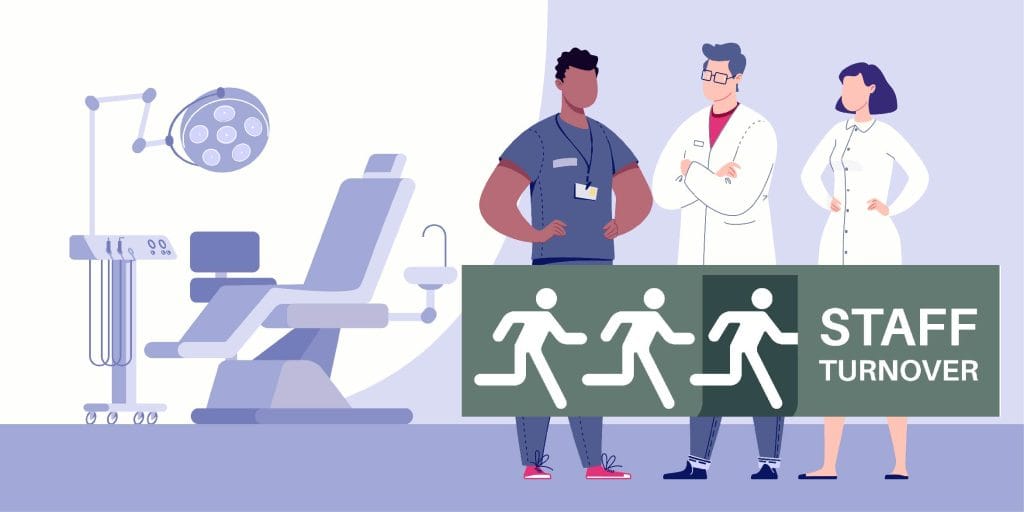Last updated on September 26th, 2024 at 02:45 pm
For this week’s blog post, we’re debuting the “Ask an MGE Consultant” column. We all know that Sabri Blumberg works very hard, so we’re giving her a little break from her usual “Ask Sabri” column. Don’t worry, it’ll be back soon, but until then we think you’ll find you’re in very capable hands with MGE’s top consultants, Chris Menkhaus, Dania Williams, and Carla Dezelic. If you have any questions of your own or would like help with practice management issues in your practice, they can be reached at:
ChrisM@mgeonline.com
DaniaW@mgeonline.com
CarlaD@mgeonline.com
Q: We’ve been having a lot of openings on the hygiene schedule recently. Why am I having so many cancellations and no-shows?
While reasons can vary, there are normally two possible causes for this. The most common of which is: accountability and training. In this instance, the job of running the hygiene schedule has not been assigned to anyone. Or the person that it is assigned to hasn’t been trained properly. There needs to be someone who is responsible for the hygiene schedule who schedules, confirms and follows up to make sure patients actually arrive. They would also regularly (and consistently) contact/schedule patients that are overdue for recall (i.e. reactivation).
The hygiene schedule won’t fill or control itself. Someone MUST continually work on it, as well as fix it when it goes wrong. It’s easy to push recall or reactivation programs off to the side when things get busy, but they NEED to be done regularly—every week—or you’ll set yourself up to have big holes in the schedule later on. (Note to readers – If you’d like, you can also get a free copy of our Patient Reactivation Program that specifically addresses overdue patients. Just give us a call or email me for more information).
 In most cases, handling this is all that’s needed to get the hygiene schedule under control. But if the scheduler has been trained properly and all of the things I mentioned above are being done, and hygiene is still empty, then we move on to the next most common issue: Quality of service in the Hygiene Department.
In most cases, handling this is all that’s needed to get the hygiene schedule under control. But if the scheduler has been trained properly and all of the things I mentioned above are being done, and hygiene is still empty, then we move on to the next most common issue: Quality of service in the Hygiene Department.
In this situation, there is some point along the line where service is lacking. It could be technical (poor clinical skills by the hygienist, hurting patients’ gums, etc.), chairside manner (patients are somehow being offended by the hygienist) or some other service issue (patients being made to wait unreasonable amounts of time, being treated poorly at the front desk, etc.).
You can think of this the same way you’d think about a restaurant: if the restaurant can’t get and keep customers, at some point you have to take a look at the quality of the food and the service. There’s a reason people don’t want to come back. It may be a simple fix or it may require some serious reorganization or training for the staff.
Hope this helps!
(Related: 5 Simple Ways to Boost Hygiene Production)
Q: I’m trying to hire a new front desk person but I’m not getting many responses to my ads. Why is this?

The most common issue I find when someone isn’t getting enough responses is that they are thinking too small. If you only have one ad posted in a single place, your number of responses will be consequently small.
After all, hiring ads are advertisements. And in any advertisement, you’re trying to get the word out, meaning you want it to appear as broadly and reach as many people as possible. In a new patient ad, you’d want as many people to see it as many times as possible, right? Same with a hiring ad.
Hiring is really a numbers game. The more people you interview, the more likely you are to find the person who’d be a great fit in your office. So advertise as widely as possible.
 In addition to general online job search sites (Monster.com, indeed.com, Craigslist and CareerBuilder), there are several dental specific hiring websites (ihiredental.com, dentaljobs.com, dentalpost.com, etc.). You can also use social media. Ask your staff if they know someone (and your staff can post about it on social media, too). Look at any patients that might be potential employees and ask them if they (or someone they know) might be a good fit. Talk to your supply reps or any other contacts you might have in the industry.
In addition to general online job search sites (Monster.com, indeed.com, Craigslist and CareerBuilder), there are several dental specific hiring websites (ihiredental.com, dentaljobs.com, dentalpost.com, etc.). You can also use social media. Ask your staff if they know someone (and your staff can post about it on social media, too). Look at any patients that might be potential employees and ask them if they (or someone they know) might be a good fit. Talk to your supply reps or any other contacts you might have in the industry.
Those are just a few ideas of places to look. If you do that and you’re still having trouble filling positions in your office, give me a call and I’ll do my best to help you figure out why!
(Related: Hiring a Front Desk Employee with No Prior Dental Experience)
Q: Should the doctor discuss fees with the patient?
The short answer:
Yes. The doctor should at least give a ballpark figure.
The long answer:
Yes again, but what’s really important here isn’t the financial details. It’s that the doctor spends the necessary time with the patient to address their concerns and ensure the patient wants to do the treatment. This means that the patient really understands what’s going on in their mouth and what it’s going to take to fix it.
The doctor’s word will usually hold more weight with the patient and there are certain questions that only the doctor can answer. So the goal here is that by the time the patient gets to the front desk to schedule (or make financial arrangements), they understand their treatment plan, have handled their concerns for the most part, know the cost and are generally on-board with moving ahead.
Now here’s the thing: oftentimes you don’t really know if the patient is on board until the fee is brought up. The patient can nod along throughout the case presentation, but how can they really agree to the treatment plan if they don’t know how much it will cost?
So the doctor should at least give a ball-park figure. Something like, “This is going to cost you about $5,000. We’re going to maximize your insurance with that, so your portion may be about $4,000 to get this done. How would you normally pay for something like that?” And they can briefly cover the financial options, “We offer 0% interest financing, payment plans, or you could put it on a credit card. What works for you?”
Now that it’s time for the patient to commit, you’ll very likely find out their real concern, which the doctor can handle best. “But I don’t like needles…”, “Is it going to hurt?” Or “Are you really going to grind my teeth into little nubs?”
So it’s really not about the money…but discussing the money is an important step in helping the patient understand their treatment plan and get on board with becoming fully healthy.
Hope these were helpful! Thanks again for reading and if you want to keep getting tips and advice to improve your practice, subscribe to our weekly blog!




No Comments
Be the first to start a conversation